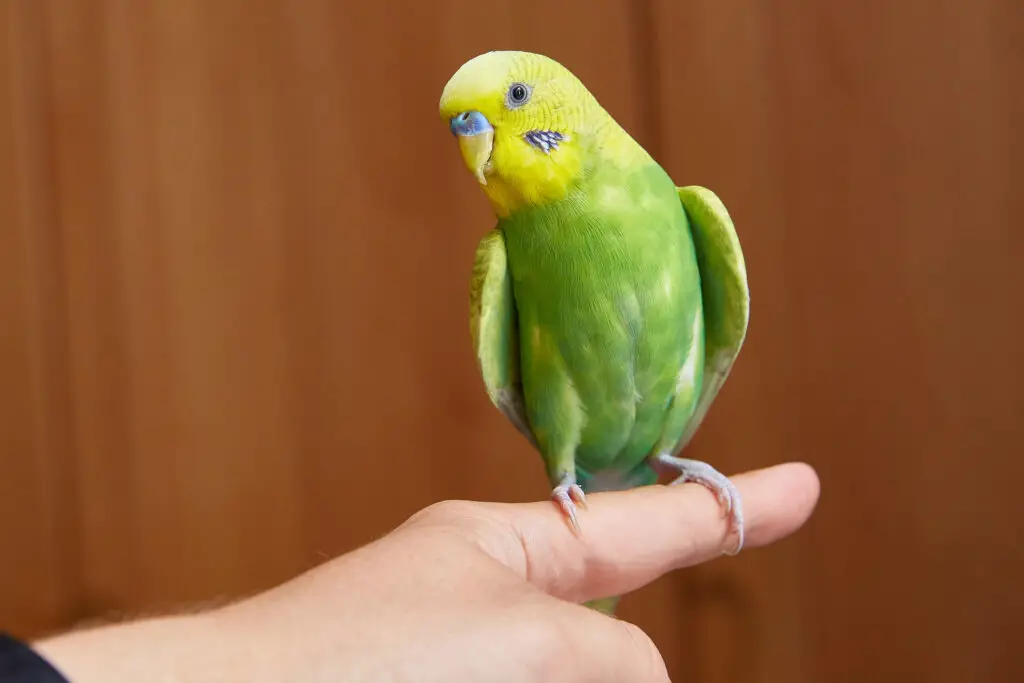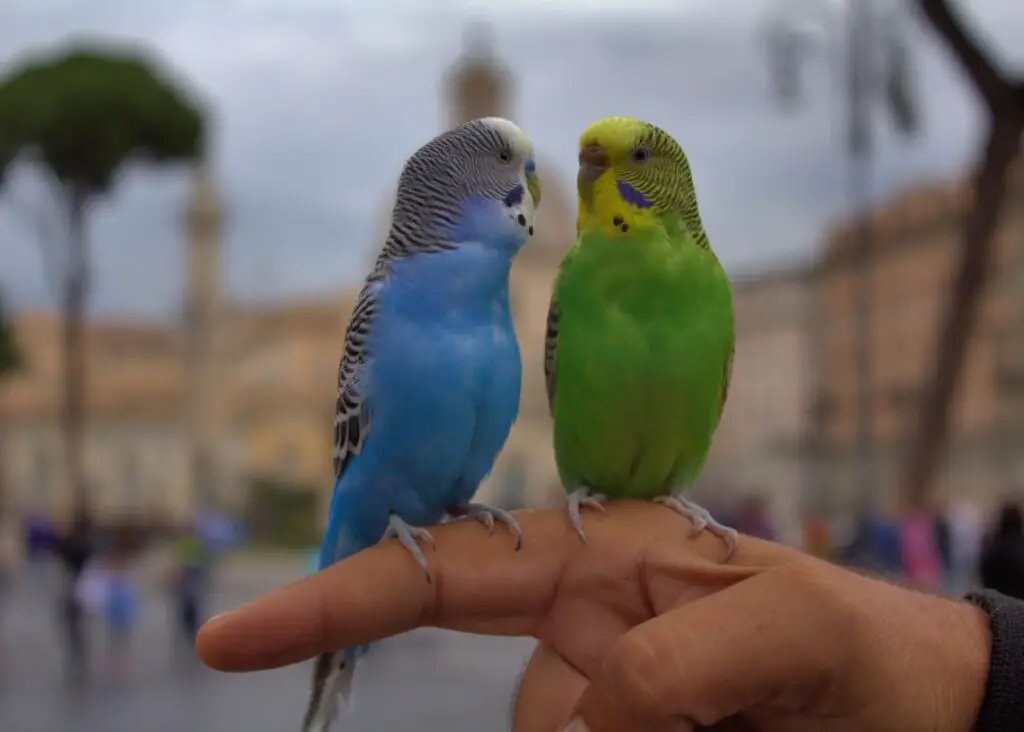Biting is a defense mechanism that parakeets use in the wild. So, even in captivity, your pet budgie may still have this nature. However, this fact does not mean that parakeets are inherently aggressive.
These birds will only bite humans if they feel threatened or if they are not familiar with the person trying to interact with them.
If you are planning to get a budgie as a new family member, you may wonder, “do parakeets bites hurt?”
Key Takeaways
This article will discuss the following:
- How painful and forceful is a parakeet’s bite
- Reasons why a budgie may bite its human companion
- How to stop a parakeet’s biting behavior
- How to train a parakeet to stop biting
A parakeet’s bite force measures 12.98 N, but it can control how forceful the bite will be. The pain caused by this bird’s bite can feel like a short, sharp pain. More forceful parakeet bites are more painful and can cause slight bleeding.
Parakeets are entertaining pets until they keep on biting you. So, in this article, we will discuss how you can stop your parakeet’s biting behavior.
Do Parakeets Bite Hurt?

Considering how small parakeets are, have you ever asked yourself, “do parakeets bite hurt?” Parakeets, or budgies as some people call them, are small, friendly, and relatively docile birds. Although these birds are not as cuddly as other parrots, they are good at tolerating human touch. Such is especially true if they trust the person trying to touch them.
But parakeets are still animals regardless of how much people have tamed and domesticated them. For this reason, they have the instinct to bite, be it on purpose or accidentally.
How Painful Is A Parakeet’s Bite?
Parakeets can control how much force they put into their bite. Meaning every bite will feel different, affecting whether it will hurt you.
Try pinching your skin sharply. That is how much pain a typical parakeet bite can bring. The most common bite a budgie may give you is a nip on the skin, usually when you are not anticipating it. A parakeet’s nip leaves a red mark, but it is not enough to break your skin and cause bleeding.
Moreover, a parakeet may bite you forcefully. In this case, the bite may break the skin, thus causing a bit of bleeding and more pain than a nip. Your parakeet will also maintain its hold on your skin for a few seconds.
If a parakeet feels that you are a threat, it will increase its bite’s force to protect itself. Even worse, it will cling harder on your skin the more you try to get away from it. This situation usually happens if you accidentally hurt your parakeet or do something that makes it feel uncomfortable.
A budgie bite will shock you as it happens suddenly. When your feathered friend bites you, chances are you will jerk your hand away in an attempt to break free from its beak. This move can make the bite more painful than it needs to be. It may even lead to a minor injury.
How Powerful Is A Parakeet’s Bite?
According to the Journal Of Anatomy, a parakeet’s bite force measures 12.98 N. The pressure may increase to 16.74 N once the bird closes its jaw and exert more force. While this bite force is no match for how powerful a large’s parrot’s bite is, it can still cause some pain due to how small it will pinch your skin.
Moreover, it is essential not to mistake beaking for biting. A parakeet will beak your hand to familiarize itself with you as if trying to make introductions. Beaking does not hurt and only involves light nibbling at your hands and fingers without force.
Reasons Why A Parakeet May Bite You
Parakeets will not bite anyone for no reason unless the bite is accidental. Knowing the possible causes for your feathered friend’s sudden aggressive behavior will help you avoid them, thus preventing the parakeet from biting you.
Your parakeet did not hurt you on purpose.
As mentioned, a parakeet’s way of interacting with its caretaker is beaking or nibbling. However, your pet may get too excited when playing with you, which causes it to increase the force of its nibbling unknowingly.
Suppose your pet is behaving normally when it bit you. In that case, chances are it was an accident and not something to worry about unless it is a repeat incident.
You are invading its personal space.
Parakeets are territorial. While they require human interaction, they also know when they want some space. As mentioned, budgies are not a fan of cuddling. For this reason, going beyond simple petting can make it feel like you are invading its personal space.
As a result, your feathered companion will bite you as a sign that you need to back off.
Something is causing stress to your parakeet.
According to a study published in Behavioral Ecology, stress is linked to the personality traits of a parakeet. So, a budgie acting differently from its usual behavior can either be stressed, scared, or upset. If you try to touch it suddenly, chances are it will bite you to protect itself.
If your feathered companion is displaying aggression, do not attempt to touch it. Instead, talk to it softly until it returns to its usual behavior.
Moreover, handling your pet roughly can cause it stress. While budgies are naturally tolerant and friendly, they will not tolerate it if someone handles them roughly. If your parakeet cannot escape your rough handling, it will defend itself by biting you.
Your parakeet is excited.
Apart from playtime, nothing excites a budgie more than feeding time. Your feathered friend becomes restless at the sight of food. As a result, it may bite your finger instead of the food once you place it near its beak.
How To Discourage A Parakeet’s Biting Behavior

According to veterinarian Dr. J. Hooimeijer, birds like parakeets may develop biting as a learned behavior. Failing to stop your pet from biting will cause biting to be a part of its behavior.
However, the worst thing you can do when your parakeet bites you is to yell at it. By screaming at your parakeet, you reinforce its behavior by giving it the attention it wants.
Punishing your parakeet can also result in fear and distrusts. Instead of a punishment, below are the things you can do to stop your budgie’s biting behavior:
Identify the cause of its behavior.
The easiest way to stop a parakeet from biting you is to identify the cause of its behavior. Does your feather friend become aggressive when you handle it in a particular way? Observe what you do when bonding with the parakeet that causes it to bite you.
By understanding your parakeet’s behavior, you can avoid stressing or threatening it, thus stopping its biting behavior.
Socialize with your parakeet.
Another reason why a parakeet may bite you is boredom. Bored budgies become aggressive, so it is crucial to socialize with your pet consistently.
For instance, you can teach your feathered friend some tricks to keep it busy. This way, your pet will become happy, decreasing aggression likelihood.
When interacting with your parakeet, ensure that your gestures and voice are gentle. A rough behavior and loud voice can trigger the self-defense instinct of your budgie, causing it to bite you painfully.
Make sure your parakeet has enough toys.
Understandably, you cannot interact with your budgie all the time. For this reason, it is vital to provide your feathered friend with enough toys to keep it occupied when you are not around.
According to Franklin D. McMillan, DVM, DACVIM, mental stimulation causes an animal’s brain to work optimally. For this reason, the lack of mental stimulation can cause your parakeet to develop abnormal behaviors, such as biting. So, to ensure your pet will not produce such behaviors, you must provide it with mentally-stimulating toys.
Some good toys that you can provide your budgie are:
- wooden blocks
- stackable cups
- foraging toys
- climbing ladders
Do not react
Like punishing your budgie, reacting from its bite will reinforce the behavior. Even if your reaction is adverse, your pet will see this reaction as a form of attention. As a result, it may use biting to make you notice it.
For this reason, the best way to stop the biting behavior of your parakeet is not to give any reaction. Of course, ignoring a bite can be difficult as it can be painful and surprising. However, not giving any response is the only way to discourage your bird from biting you again.
Let your pet know what to expect each day.
Some of the other reasons why your parakeet may bite are:
- hunger
- tiredness
These things usually happen because you are not keeping a regular schedule for your feathered friend. For this reason, you must create a daily pattern you and your parakeet can follow. For instance, feed your parakeet at the same time every day so it knows when to expect its meals.
You also need to schedule when you will play with your parakeet. This way, your parakeet will have the space it needs and some time to rest. Keeping a schedule will also improve your feathered friend’s temperament.
Training Your Parakeet To Stop Biting
According to Laurie Hess, DVM, birds, like parakeets, can sense human emotion. For this reason, the first rule you need to know when training a parakeet to stop biting you is to remain confident when handling it.
Below are the steps you can do when training your budgie to stop biting:
Put the bird down
Treat your parakeet like a child having a tantrum. If it bites you while you spend time with it outside the cage, do not say anything. Instead, take the bird back into its cage and walk away. In time, your budgie will understand that biting is unacceptable, discouraging it from repeating this behavior.
Tap the beak gently.
After giving your parakeet a time-out, you can take it out of its cage again to observe if it will repeat biting you. If it does, an effective technique you can do is to pat its beak gently. However, ensure that you only pat its beak lightly to avoid hurting your pet.
This technique will take a few attempts before it works.
Show the parakeet its bite mark.
After gently touching your parakeet’s beak, hold your bitten finger close to its beak while showing it the bite mark. This step will signal your bird that its behavior is hurting you. If your feathered friend understands your gesture, it will not bite you again.
If the parakeet pecks you again, repeat tapping its beak and showing it your finger. Keep on doing this technique until your parakeet stops biting you.
Do Parakeet Bites Require A Doctor’s Attention?
Tiny seeds and nuts are the hardest things your parakeet can ever crush using its beak. The worst thing it can do to a human is to bring sharp pain and cause bleeding, but it can never do a severe injury. For this reason, this bird’s bite does not require a doctor’s attention as long as you wash and clean it with an antibacterial solution.
However, observing the bite for a few days would be best. If you notice redness and swelling around the bite wound, it is ideal to have it checked by a doctor for infection.
The Takeaway
A parakeet will only bite you if it feels stressed or threatened by your presence. These birds are friendly, so they can tolerate human touch as long as you are not petting them too hard.
A budgie’s bite may hurt, depending on the force the bird exerts into biting you. Beaking, which is your pet’s way of interacting with you, is different from biting and does not hurt at all.
These Articles May Also Interest You
- Noisy Parakeets And What To Do About It
- The Parakeet Vs. Parrotlet (A Complete Comparison)
- Can Parakeets Eat Strawberries?
- Can Parakeets Eat Blueberries?
- Parakeets And Cockatiels: Are They The Same?
- Reasons Why Parakeets Make Good Pets
- Can Parakeets Eat Watermelon?
- Can Parakeets Eat Cucumbers?
- Three Places Where Parakeets Live
- Can Parakeets Eat Grapes?
- Parakeets and Cockatiels: A Comparison
- Can Parakeets Eat Tomatoes? (Read This First!)
- 5 Reasons Why Parakeets Will Die
- Why Do Parakeets Bob Their Heads?
- When Parakeets Kiss: Why They Do It And What It Means
- Can Parrotlets And Parakeets Get Along? (Find Out Here)
- Can Parakeets Eat Carrots?
- 7 Things A Parakeet Needs
- Parakeets and Cockatiels: A Comparison
- What Does it Mean When Parakeets Puff Up?
- The Parakeet Vs. The Lovebird: The Differences Explained
- Carril, Julieta, Federico J. Degrange, and Claudia P. Tambussi. “Jaw myology and bite force of the monk parakeet (Aves, Psittaciformes).” Journal of anatomy 227, no. 1 (2015). doi: 10.1111/joa.12330. Accessed February 14, 2023.
- Medina-García, Angela, Jodie M. Jawor, and Timothy F. Wright. “Cognition, personality, and stress in budgerigars, Melopsittacus undulatus.” Behavioral Ecology 28, no. 6 (2017). DOI: https://doi.org/10.1093/beheco/arx116. Accessed February 14, 2023.
- CPBC, J. Hooimeijer DVM. “The Facts and Myths of Aggressive-Biting Behavior in Parrots.” https://www.adviespraktijkvoorvogels.nl/wp-content/uploads/2015/05/The-Facts-and-Myths-of-Aggressive-Behavior-.pdf. Accessed February 14, 2023.
- McMillan, Franklin D. “Development of a mental wellness program for animals.” Journal of the American Veterinary Medical Association 220, no. 7 (2002). https://avmajournals.avma.org/downloadpdf/journals/javma/220/7/javma.2002.220.965.pdf?pdfJsInlineViewToken=1551078499&inlineView=true. Accessed February 14, 2023.
- Laurie Hess, DVM, Diplomate ABVP. “How to Discourage Your Bird from Biting.” How to Train Birds Not to Bite (blog). February 27, 2017. https://www.petmd.com/bird/training/how-train-birds-not-bite. Accessed February 14, 2023.




